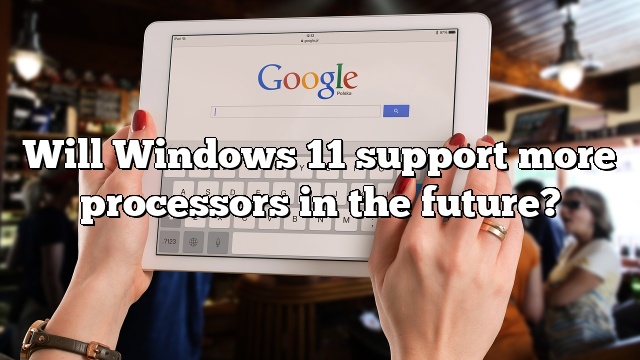The processor requirement is the most restrictive; supported processors include 8th-generation and newer Intel Core processors as well as AMD Ryzen 2000-series processors and newer. These are all chips that launched in late 2017 and early 2018. Older computers can’t officially run Windows 11.
The processor requirement is the most restrictive; supported processors include 8th-generation and newer Intel Core processors as well as AMD Ryzen 2000-series processors and newer. These are all chips that launched in late 2017 and early 2018. Older computers can’t officially run Windows 11.
While Microsoft has found a few exceptions and managed to tailor newly discovered additions to supported processors, it’s unlikely that older processors will specialize in the future. You can read the entire article in detail at this link. Why is Windows 11 limited to certain processors?
Surprisingly, Microsoft supports some 7th generation X-series processors on Windows 11. Microsoft may expand support for other 7th generation processors in the future, but perhaps not due to significant security differences (related, among other things, to specific Specter and Meltdown vulnerabilities) between the 7th generation. Gen and 7 Gen (and beyond).
In the future, support may be open when the official version pointing to Windows 11 is RTM and allows for at least 6 generations. Core and mainstream Ryzen processors have been updated to Windows 11.
Since the announcement of Windows 11, Microsoft has had many websites conflicting with the new CPU requirements. However, after the first few days, the company’s communication should have become clearer. According to Microsoft, Windows 11 only guarantees support for the following processors: Intel processors: 5th generation or later.
Will Windows 11 support more processors in the future?
Will Windows 11 support more processor chips in the future? This is exceptionally unlikely as these processor requirements depend on the ability to support Windows 11’s smoother privacy and security features. Basically, Windows 11 is facing far fewer kernel crashes on new processors due to its new DCH trend principles.
Does Windows 11 support older processors?
Windows 11 still doesn’t support older Intel and AMD processors, but users can obtain and install the operating system manually.
Will Windows 11 eventually support older processors?
A: Yes, Microsoft’s recent announcement that Windows 11 will not support Intel 7th generation and older processors or later AMD 1000 Ryzen processors has certainly caused an uproar in the tech press.
Why are dual processor processors better than single core processors?
The cores act like processors within a single-chip processor. The more cores a processor has, the more tasks it can perform simultaneously. The kernel can only perform one task at a time, although other kernels perform other tasks assigned by the program. Thus, the overall functionality is greatly improved compared to older single core processors.
How are CNN processors different from Ann processors?
In both cases, the processors are multi-input dynamic systems, and the default behavior of the global systems is controlled by the unit of elegance linear relation weights. However, in CNN processors, connections are local, while in connections they are global.
Why are ARM processors more efficient than Intel processors?
Well, the efficient interconnection of the RISC architecture allows it to use fewer transistors than the Intel x86 processors commonly found in laptops and then desktops, helping ARM-based chips consume power efficiently and reduce heat generation.
Which strategy is more suitable for shared memory systems where the communication of data between processors does not need to be planned in advance because distinct sub problems can be executed on different processors?
Parallelism. Divide and conquer algorithms are suitable for running on multiprocessor machines, in systems with shared memory, where there is no need to schedule data transfer between processors during development, since different subtasks can be solved on different processors.
Will Windows 11 support more processors in the future?
Will Windows 11 support many processors in the future? This can be said to be unlikely as these processor states are related to the ability to handle advanced privacy and security features in Windows 11. Essentially, Windows 11 is facing fewer kernel crashes on current processors thanks to new DCH design principles.
Does Windows 11 support older processors?
Windows 14 still does not support legacy Intel and AMD processors, users can manually download and install the specific OS.
Will Windows 11 eventually support older processors?
A: Yes, Microsoft’s recent announcement that Windows 11h will not support 7th generation and may affect older Intel processors, as well as AMD and Ryzen 1000 and older processors, has always caused a storm in the computer press releases.
Why are dual processor processors better than single core processors?
The cores act like processors within a single-chip processor. The more cores the CPU has, the more tasks this situation can process simultaneously. One core amuses itself with one task at a given time, while the other cores perform other actions assigned by the system. Thus, the new overall performance is greatly improved compared to the old single-core processors.
How are CNN processors different from Ann processors?
In any case, processors have always been dynamic systems with multiple inputs, and the operation of all systems was mainly dependent on the line connection of the processor. However, in recent CNN processors, connections are established locally, while in ANNs, all connections are established.
Which strategy is more suitable for shared memory systems where the communication of data between processors does not need to be planned in advance because distinct sub problems can be executed on different processors?
Parallelism. The divide-and-conquer tactic is, of course, suitable for execution on multiprocessor machines, especially in shared memory systems where communication between data processors does not require preconfiguration, because now different subtasks can be performed by processors in different ways.

Ermias is a tech writer with a passion for helping people solve Windows problems. He loves to write and share his knowledge with others in the hope that they can benefit from it. He’s been writing about technology and software since he was in college, and has been an avid Microsoft fan ever since he first used Windows 95.
